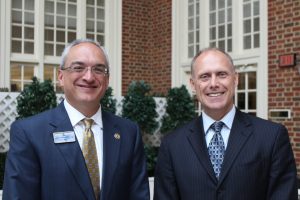
Dean Michael V. Hernandez, Barry W. Bussey
It was my privilege to speak at the Regent Law Review Symposium. The Regent Law Review celebrated 25 years at this event with special alumnus Justice Daniel Kelly.
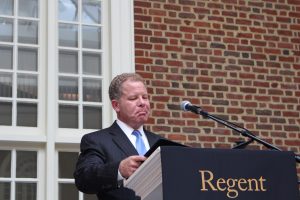
Justice Daniel Kelly, Wisconsin Supreme Court
The former editors-in-chief over the 25 years were present.
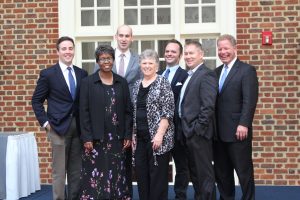
Former Editors of the Regent Law Review
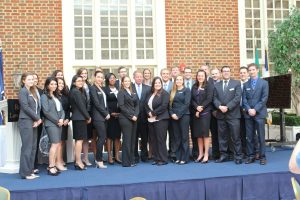
Current Editorial Staff of the 2016-2017 school year.
The symposium was organized to discuss the clash between “Enumerated and Unenumerated Rights.” For those of you who are not accustomed to those terms let me just explain.
Enumerated vs. Unenumerated Explained
“Enumerated rights” are those rights that are specifically listed in the constitution. The most important one, for our purposes, is the freedom of religion. In the United States it is contained in the First Amendment of the US constitution that states: “Congress shall make no law regarding an establishment of religion, or prohibiting the free exercise thereof.” This has come to mean that the government cannot have an established church like the Church of England in the UK and it must not interfere with its citizens belief and practice of religion.
In Canada religious freedom is guaranteed in section 2(a) of the Charter of Rights which states, “Everyone has the following fundamental freedoms: (a) freedom of conscience and religion.”
So religious freedom in both the US and Canada is “enumerated” in the respective constitutions – they are specifically listed.
Over the years the courts have added other rights to the constitution. The one at issue that gave rise to this symposium was the US Supreme Court decision in the case Obergefell v. Hodges where it was stated, “The Fourteenth Amendment requires a State to license a marriage between two people of the same sex and to recognize a marriage between two people of the same sex when their marriage was lawfully licensed and performed out-of-State.”
The right to such marriage was not listed in the US Constitution but it is now a constitutional “unenumerated right”. It has the same effect as if it were listed (enumerated) in the constitution from the beginning. It is the highest law of the land.
In Canada, same-sex marriage is a bit more complicated. While “sexual orientation” in s.15 of the Charter is now an unenumerated right as a result of the Canadian Supreme Court’s decision in 1995 in Egan v. Canada, the issue of marriage is a more circuitous affair. In 2004 in the Supreme Court refused to answer the federal government’s question as to whether the redefinition of marriage was required by the Charter because the government had already accepted the lower courts’ decisions on that point. However, it ruled that the federal government has the jurisdiction to redefine marriage. The government did so with the passing of the Civil Marriage Act which defined marriage as “any two persons.” Same-sex marriage is a reality in Canada because of government legislation and not the constitution per se (I am sure that there are those who would oppose my view – and they would have an equally valid position). Though if the SCC ever had to answer the question directly there is little doubt that it would decide that the right to same-sex marriage is an unenumerated constitutional right. The dots just have not been formally connected by the Canadian Supreme Court, but for all practical purposes it has.
The Clash of Rights
I think there is an inherent problem in the relationship between enumerated and unenumerated rights. The problem is that enumerated rights are culturally accepted norms with a much longer history than unenumerated rights. Unenumerated rights do not have the same cultural history and baggage and are therefore prone to struggles of assimilation in the culture. It is not that they won’t over time but there is an inherent disadvantage of sorts vis a vis the established enumerated rights.

Faculty of Law at the Robertson Hall, Regent University
This is evident with sexual equality rights expressed in the right to marry between non-heterosexual couples and the more established religious freedom rights of religious institutions that maintain traditional marriage. As regular readers of this blog are well aware this lies at the heart of the struggle Trinity Western University is having with the law societies in British Columbia, Ontario and Nova Scotia who refuse to accept TWU law graduates because of TWU’s insistence that its community not engage in sexual intimacy outside of marriage as between one man and one woman.
The US Supreme Court’s Obergefell decision has raised concern among religiously affiliated law schools that the treatment TWU has faced in Canada is but a harbinger of what is to come for US religiously affiliated law schools. In my view, they have every reason to be concerned.
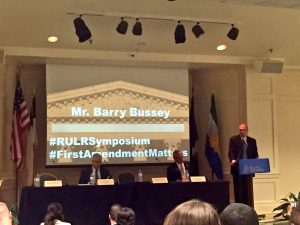
Barry W. Bussey, speaking on the Irreconcilable Differences at Regent Law Review Symposium
Irreconcilable Differences
I am now in the process of writing an in-depth analysis of this issue for the Regent Law Review. However, in my presentation this last weekend I described what I call the “Irreconcilable Differences.” Here are a few notes of my talk (not necessarily as presented). In reality it is but the start of my analysis:
Angelina Jolie cited the ubiquitous phrase, “irreconcilable differences,” as the cause of starting divorce proceedings against husband Brad Pitt. That phrase marks the end of a relationship.
I fear that there is falling upon the Western world a shroud of irreconcilable differences between the state and religious communities. This shroud is one of mistrust. A mistrust born from the state’s choice to make sexual equality rights superior to the rights of religious communities to continue their religious practice of affirming marriage as being of one man and one woman for life.
Nothing has galvanized public discourse over the last 15 years quite like the right of religious communities to continue involvement in charitable pursuits such as schools and universities. Sexual equality advocates have put forth the position that such religious enterprises are public endeavours due to the fact that they require the state’s imprimatur to be successful. A school or a university requires state accreditation to ensure that graduates receive a recognized diploma. And when that university “discriminates” against sexual minorities by maintaining a code of conduct that expects students to adhere to heterosexual marriage then an offense has occurred to the non-heterosexual minority. The offense may be classified as a harm to dignity.
This characterization makes it very difficult for a compromise to be obtained. Sexual equality advocates demand either the religious school not practice its belief on marriage or not receive accreditation. In short having the institution shut down would be more acceptable to this view. My argument is that this position is simply unworkable for a plural liberal democracy. The liberal democratic project to maximize individual freedom while maintaining civil peace will not be realized. We are bound for troubling politics going forward unless we are collectively able to agree to disagree and respect the choices of the other.
My proposed paper will review the growing militancy of those who seek to restrict religious freedom from what has been the norm to a more impotent and sterile version of religious freedom that is confined to the four walls of a place of worship. The paper will also consider what can be done to ensure that freedoms from both sides of this dispute may be best preserved ensuring that we maintain liberal democracy’s project going forward.
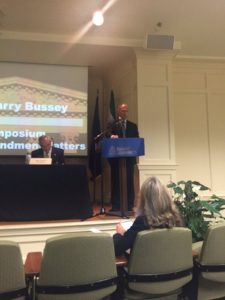
We only have to consider the growing impatience with religious institutions and communities among the intellectuals. Consider Harvard Professor Mark Tushnet in a blog post where he proclaimed that the liberals have won the culture wars:
For liberals, the question now is how to deal with the losers in the culture wars. That’s mostly a question of tactics. My own judgment is that taking a hard line (“You lost, live with it”) is better than trying to accommodate the losers, who – remember – defended, and are defending, positions that liberals regard as having no normative pull at all. Trying to be nice to the losers didn’t work well after the Civil War, nor after Brown. (And taking a hard line seemed to work reasonably well in Germany and Japan after 1945.) I should note that LGBT activists in particular seem to have settled on the hard-line approach, while some liberal academics defend more accommodating approaches. When specific battles in the culture wars were being fought, it might have made sense to try to be accommodating after a local victory, because other related fights were going on, and a hard line might have stiffened the opposition in those fights. But the war’s over, and we won.[1]
There really is not much room for dialogue and discussion in those comments. It is a triumphal assertion that the decks are cleared for the future where religion will be a non-issue. The problem of course is that religion will always be an issue. The redefinition of terms that have a long cultural history is something that cannot be wiped out over night.
That does not bode well for our future. The mistrust has come about over the demands of sexual equality advocates for the removal of all vestiges, of what they call, religious privilege in society.
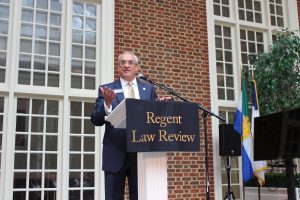
Dean Michael V. Hernandez
The redefinition of marriage is but one of many incidences equality advocates point to as religion having an inordinate influence on public policy. The Christian religion’s definition of marriage has been the state definition up until recently. In Canada, we relied upon British jurisprudence Hyde v. Hyde (1866), L.R. 1 P. & D. 130, at 133:
What, then, is the nature of this institution as understood in Christendom? Its incidents may vary in different countries, but what are its essential elements and invariable features? If it be of common acceptance and existence, it must needs (however varied in different countries in its minor incidents) have some pervading identity and universal basis. I conceive that marriage, as understood in Christendom, may for this purpose be defined as the voluntary union for life of one man and one woman, to the exclusion of all others.
In the Marriage Reference the Supreme Court of Canada was quick to expunge any notion of Christian normative influence in the modern context when it stated:
The reference to “Christendom” is telling. Hyde spoke to a society of shared social values where marriage and religion were thought to be inseparable. This is no longer the case. Canada is a pluralistic society. Marriage, from the perspective of the state, is a civil institution. The “frozen concepts” reasoning runs contrary to one of the most fundamental principles of Canadian constitutional interpretation: that our Constitution is a living tree which, by way of progressive interpretation, accommodates and addresses the realities of modern life.[2]
The ability to name something and have society accept that nomenclature is power. Colm Gillis notes, “The one who names something determines how that something is perceived or how the listenership is intended to perceive the thing from the communicator’s perspective.” This is evident all of the time – abortion is either a “choice” or a “murder.”
When the law applies labels it means something. Thus when the word “marriage” is redefined it takes on a whole new dimension. Our society must take serious its responsibility to ensure that there is a recognition that not all sectors will readily accede, within their own circle, the redefinition of terms. In the BC Court of Appeal a lawyer argued that TWU’s maintenance of traditional marriage was an “unconstitutional definition of marriage.” Her premise was that since marriage has been redefined all other definitions are no longer valid. That is simply not the case. The reality is we now have different constitutional definitions of the same term. Redefinition of long historically understood words is bound to cause confusion. It has.
James Davison Hunter, To Change The World, p. 206, says it well,
“…[W]hen the objectified and shared meaning of words is undermined, when we no longer have confidence that words signify what we thought they signified, then it is possible to impute any meaning to words one desires. And if words can mean anything, then they have no intrinsic meaning or at least no possibility of a common meaning. They only mean what we say they mean. There are no fixed points of reference. What is more, there is no authority that can be appealed to in order to definitively establish the meaning of words or to adjudicate which meaning is more truthful or better than another. God? Nature? Science? Democracy? Tradition? None of these sources of authority can be trusted because each one exists under the same questioning gaze – they too are words that have been emptied of meaning.”
Naming thus becomes an instrument of power. Those outliers who refuse to accept the redefinition must awake to the brutal reality that they are powerless subject to those in control. Thus, differences can become irreconcilable.
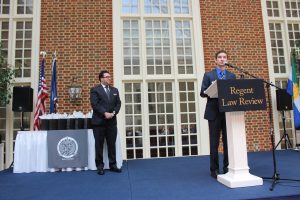
Adam Burton, Lead Symposium Editor; and at the mic Noah DiPasquale, Editor-in-Chief
However, we cannot long sustain a state of irreconcilable differences. The liberal democratic project, if it is to survive, must find a way to bridge the gap. It will be hard but it is something we must continue to strive for. We cannot allow the opposing parties to reach a point of permanent irreconcilability. Otherwise we will be ghettoized. Perhaps, in many ways, the internet has already ghettoized us into maintaining our differences while not having to deal with the other. Is this ultimately what we want? Is the ghetto the only way forward? Maybe that is the way of the future: people of like mind congregating together with only limited contact with those outside. The integration of global society would militate against such a process. However, populist elements are becoming a factor in political affairs in recent years. Is that a sign of a backlash against increased diversity and pluralism?
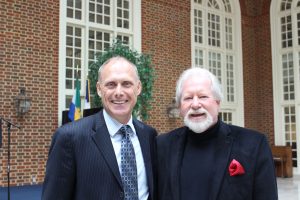
Barry W. Bussey, Prof. Bruce Cameron
Religious institutions, such as Christian law schools, are part of our diverse democratic society. They provide a different rational critique to our laws — a critique that begins from a different premise of what it means to be human and what relationships we are to have to the polis and society around us. We have different articulations of the common good. Different approaches to the world’s problems. These viewpoints are absolutely necessary to ensure that we have an open and full debate on human flourishing as we continue to occupy the same planet.
Closing Observations About Regent University Law School

I was impressed by the great program that was put on by the students of the Regent University Law Review. They were organized. They were hospitable and were patient with my long conversations about one topic after another. A tremendous group of young people who are intent on learning and have already obtained a professionalism that is noteworthy.
My discussions with the faculty including Mike Hernandez, Lynne Marie Kohm and Bruce Cameron reveal a highly qualified and competent group who are wanting to make a difference for the cause of justice in this world. This school is serious about ensuring that its graduates have what it takes to be successful in the practice of law.
The school itself is simply beautiful. Just to walk up and down those stairs gives one a sense of awe. Many modern law school buildings do not have that regal ambiance — Regent definitely does. The architecture itself speaks volumes about the respect for the rule of law.
A beautiful campus, competent staff and great students — I was, if you cannot tell, impressed.
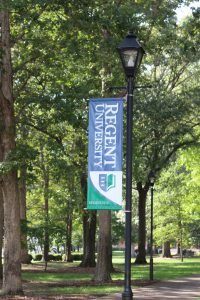
[1] Mark Tushnet, “Abandoning Defensive Crouch Liberal Constitutionalism,” Friday, May 06, 2016 Online: https://balkin.blogspot.com/2016/05/abandoning-defensive-crouch-liberal.html (accessed October 2, 2016.
[2] Reference re Same-Sex Marriage, [2004] 3 S.C.R. 698, 2004 SCC 79, at para. 22.


Thank you once again for a clear, concise column on a matter that is of utmost importance to all!
Mr. Bussey, it was an honor to have you participate in our symposium. Your presentation was a great benefit for the students at Regent Law, and it was a personal pleasure to meet you. Thank you once again for visiting our school and taking part in this important discussion!
Hi Noah – it was my pleasure. You are involved in important work that is going to resonate throughout your career and will make a positive difference in the world!